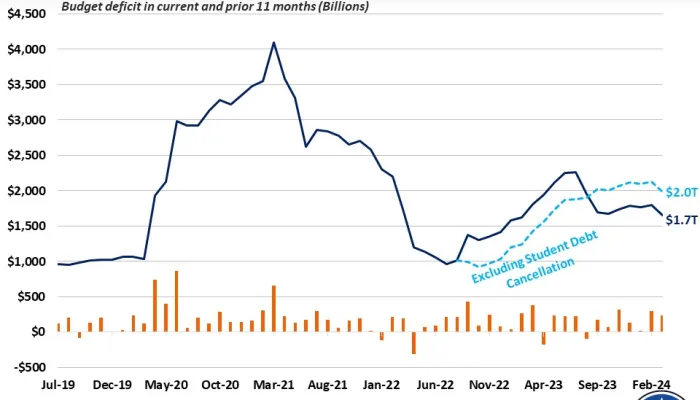Seven Resolutions for the Fiscal New Year
October 1 marked the start of Fiscal Year (FY) 2018. While FY 2017 saw very little major legislation passed, a new year brings new opportunities.
Lawmakers have some big items on their plate, such as tax reform and any potential health care reforms, and they must still fund the government.
With that in mind, we have seven resolutions they should adopt for the fiscal new year.
- Stop digging. Lawmakers should at the very least stop adding to the national debt in the new fiscal year. However, they seem poised to do the opposite, with the proposed Senate budget allowing tax reform to add up to $1.5 trillion to deficits over the next decade. Any tax or health care changes should instead be fiscally responsible. Likewise, lawmakers must deal with appropriations by December 8 to keep the government funded and avoid a shutdown. In doing so, they may raise the caps that apply to that spending. Lawmakers should ensure that any changes to spending caps are fully offset (unlike the last deal of this type). FY 2018 should be the year lawmakers put the shovel down and stop digging the debt hole deeper.
- Pass a budget that puts debt on a declining path. The new fiscal year begins without a federal budget to guide us. It is important that Congress agree on a budget that legitimately puts debt on a downward path as a share of the economy. Both the House and Senate budget claim enough savings to reduce the debt, but both rely on gimmicks, particularly unrealistically high economic growth assumptions. We estimated that the House budget would only stabilize debt at its current high level without its gimmicks, while the Senate budget relies on over $4 trillion of unspecified mandatory savings. The final budget agreement should include realistic and at least somewhat specified deficit reduction to make debt sustainable. Lawmakers should commit to getting the budget process back on track in FY 2018.
- Enact responsible tax reform. After over 30 years without a major overhaul, the U.S. tax code is due for reform. Done right, comprehensive tax reform can help grow the economy and ease our budget challenges. But tax cuts that add to the debt will only slow economic growth and worsen our fiscal problems over the long run. We estimated that the current tax framework could add $2.2 trillion to deficits over the next decade. Lawmakers must resolve to do better.
- Use reconciliation for meaningful deficit reduction. Budget reconciliation can be a powerful tool for addressing our fiscal challenges. Although both the House and Senate budgets include reconciliation instructions, they are inadequate. The House includes $203 billion of savings, a modest first step, but the Senate goes in the complete opposite direction with a $1.5 trillion deficit increase. Including instructions for more significant deficit reduction would not only improve the fiscal situation, but would also make the budget more credible by providing an avenue to actually enact the savings that the budgets promise.
- Don't resort to gimmicks. As lawmakers consider legislation, they should avoid the use of budget gimmicks to make their work look more responsible than it is. There are plenty of gimmicks lawmakers might use to satisfy budget targets or make legislation look deficit-neutral. There is particular danger in tax reform, where lawmakers can use temporary revenue increases to offset permanent tax cuts or expiration dates to make the cost seem smaller, but other legislation can also contain sleight of hand. FY 2018 should be gimmick free.
- Reform the debt ceiling instead of simply repealing it. The debt ceiling has been suspended through December 8, and extraordinary measures will likely keep the federal government from defaulting on its debt through early next year. Last month, there was talk of eliminating the debt ceiling entirely. While this would remove the threat of defaulting on the debt, it would be better if the ceiling were reformed or replaced with a better fiscal restraint. CRFB president Maya MacGuineas suggested tying debt ceiling increases to budget resolutions or deficit-increasing legislation, setting the ceiling as a share of the economy instead of in dollars, or replacing the debt ceiling with a softer tax and spending trigger. The Better Budget Process Initiative also has suggested several ideas for reform. We should improve the debt limit in FY 2018, not get rid of one of the few mechanisms that promotes fiscal accountability.
- Use full CBO scores. This year saw an unusual amount of disregard for the estimates of the nonpartisan Congressional Budget Office (CBO), as the Senate considered voting on an Affordable Care Act repeal and replacement plan without a CBO score and a proposal in the House would have effectively stripped CBO's scorekeeping capacity. CBO's work is invaluable in informing Members of Congress and the public about the fiscal, economic, and other effects of legislation. It should not be brushed aside so lawmakers can get more favorable outside scores.
Celebrate the new fiscal year responsibly by creating a responsible federal budget with our Debt Fixer interactive budget tool.
So long FY 2017. Here's hoping for a prosperous and responsible FY 2018.


